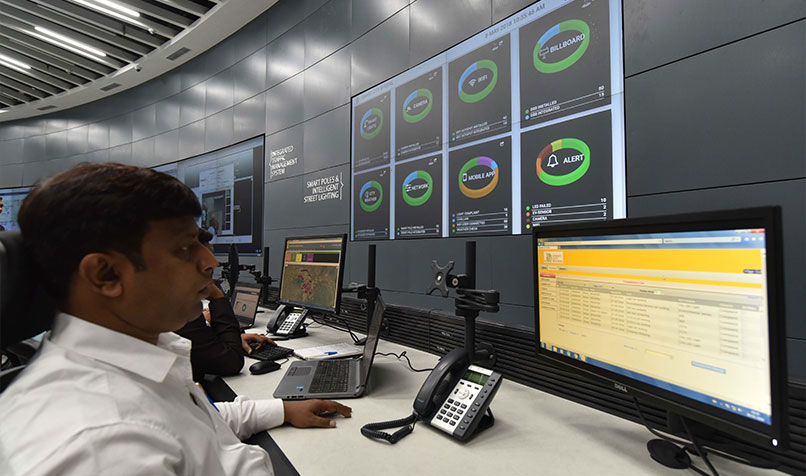Loading component...
At a glance
For almost three decades, Praba Santhanakrishnan chased the “American dream” as an Indian expatriate, carving out a stellar career as a software engineer with Microsoft. This included playing a key development role with Microsoft’s famed Xbox gaming platform.
Today, the data science guru is relishing work and life in Chennai, capital of the southern Indian state of Tamil Nadu. The return to his home country was motivated by a similar reason to the one that led Santhanakrishnan to the US – India is the new “land of opportunity”.
“The reason I left India in the 1990s and went to the US was all about jobs, money and other prospects,” says Santhanakrishnan, the CEO and co‑founder of Cookr, an app for homemade food deliveries that connects time‑poor consumers with talented home chefs.
“Now the trend is completely changing. People are coming back to India from the US to work, to start a business and for many other opportunities.”
Santhanakrishnan is representative of the “brain drain” reversal that is occurring, as gifted, financially secure Indian expats return to one of the world’s economic powerhouses.
While some economists believe the US is on the brink of recession, Santhanakrishnan sees no signs of a slowdown in India.
“The businesses are all buzzing, and there is widespread activity in many sectors, not just food,” he says.
Given such an upbeat mood, he is confident that Cookr, which uses digital technology to make it easy for India’s growing middle class to access nutritious, home‑cooked meals, will continue to thrive.
Santhanakrishnan’s goal is to capture 5 per cent of India’s online food delivery market, which is forecast to be worth more than US$29 billion (A$45.5 billion) by 2028, up from US$5.3 billion (A$8.3 billion) last year.
“I’m looking to build a billion‑dollar business in about four years from now, and we’re tracking to plan.”
Global economic bright spot

According to the World Bank, India has emerged from the pandemic as one of the fastest‑growing economies in the world, despite significant challenges.
In the 2023 financial year, India’s real GDP expanded by an estimated 6.9 per cent, with growth underpinned by robust domestic demand, investment in infrastructure and buoyant private consumption.
With a population of more than 1.4 billion and an ever‑growing middle class, the Asian giant offers immense potential for economic development and investment opportunities.
Investment banking firm Morgan Stanley predicts that the value of India’s GDP could more than double from US$3.5 trillion (A$5.5 trillion) today and surpass US$7.5 trillion (A$11.8 trillion) by 2031.
Gopalakrishna Mahesh CPA, director of accounting firm Financial Crest, says India has traditionally been a nation of savers, a mindset that has helped its people and businesses ride out challenges such as the global financial crisis and the pandemic better than most.
"The reason I left India in the 1990s and went to the US was all about jobs, money and other prospects. Now the trend is completely changing. People are coming back to India from the US to work, to start a business and for many other opportunities."
“This concept of savings has always been here,” Mahesh says.
“Most households in India have their savings put away for the next six or seven months, so they have the savings to take care of themselves during emergency situations.
“Businesses also have cash that has been kept as reserve funds.”
Mahesh adds that Indian businesses have been proactive during the pandemic, exploring opportunities to restructure and expand their service lines, rather than pausing operations.
CPA Australia’s Asia-Pacific Small Business Survey 2022-2023: India Market Summary
Diverse strengths
The Indian economy can count on many strengths, including the stable leadership of Prime Minister Narendra Modi, whose approval rating of 78 per cent makes him one of the most popular leaders in the world.
Under Modi, India has pushed infrastructure development, with initiatives such as the Smart Cities Mission, the Bharatmala Project, and the National Infrastructure Pipeline, which focus on improving logistics, road networks and environmental sustainability.
Significantly, Modi’s government benefits from a large and growing consumer market with high disposable incomes that is fuelling domestic consumption.
On the back of a young population – whose median age is about 28 – the nation enjoys the prospect of a dynamic workforce that can support economic growth for decades to come.
This presents opportunities for domestic and international investors in sectors such as retail, fast‑moving consumer goods and ecommerce.
Leigh Howard, CEO of University of Melbourne’s Asialink Business, says it is apparent that India’s “big domestic economic growth engine” is a major asset. Investment in infrastructure and the manufacturing and energy sectors is also propelling the country forward.
“The nation‑building program is occurring on several fronts, while India also has a highly digital economy that is translating into a strong ecommerce sector,” Howard says.
He expects India’s desire to prioritise the education of its massive population to play into opportunities for countries such as Australia.
Howard notes, for instance, that Deakin University is the first foreign university to establish an international teaching campus in the Gujarat International Finance Tec‑City smart business district.
“That’s a massive breakthrough and emblematic of the deepening relationship across many sectors,” he says.
One possible area to address, according to Howard, is India’s “protectionist sentiment” towards trade.
For countries wanting to do business in India, this means finding areas of potential trade cooperation and increasingly adopting a partnership approach.
Mahesh adds that India has a reputation for strict financial, tax and banking regulations, “but the Indian Government is working on the ease of doing business”.
This strategy is paying off. According to the World Bank, in 2022, India ranked 63rd among 190 countries for ease of doing business, a significant improvement from its 142nd spot in 2014.
Digital payday

India has long been known for its strength in traditional industries such as gems and textiles, but it is now becoming known for rapid growth in ecommerce activity, supported by the adoption of digital payment platforms.
A joint 2023 report from Google, Temasek and Bain & Company indicates that India’s internet economy is expected to register six‑fold growth and touch US$1 trillion (A$1.6 trillion) by 2030.
One business that is riding the digital wave is Notebook, an ed‑tech portal designed to help school students. Founder and CEO Achin Bhattacharyya CPA is dedicated to assisting poorer rural students on their education journey and says start‑ups like his play an important role.
“What the start‑ups have done, in terms of aggregation and streamlining processes, is ensure that any benefits reach the bottom of the pyramid,” he says.
“It’s not just about the so‑called ‘privileged class’ – the benefits are flowing down, and all people are getting an opportunity.”
This digital revolution is also at the heart of Cookr’s ambitions.
Santhanakrishnan says the rollout of the Unified Payments Interface (UPI), an instant payment system developed by National Payments Corporation of India (NPCI), is propelling traditional sectors such as food into a new digital stratosphere.
“It’s seamless, it’s reliable, it’s scalable – and it’s the best in the world,” he says.
In a further positive sign for India, Santhanakrishnan suggests that growing consumption will not be confined to just food – sectors such as travel, entertainment, fashion, cosmetics and health care are also set to flourish.
Big role for accountants
In such a thriving business market, Mahesh believes the opportunities for well‑educated and experienced accountants will be significant in coming years, as they help clients navigate a strong, but complex, business environment.
Mahesh points to the success of Financial Crest, which was set up just four years ago and powered through the pandemic on the back of its accounting and tax compliance services, in particular. The company has opened offices in the US and is considering an Australian presence, too.
“Honestly, things have gone even more positively than we expected,” Mahesh says. “Of course, there were challenges for a lot of businesses during the pandemic, but today I would say they have all bounced back and are doing twice what they were doing pre‑COVID.”
"What the start‑ups have done, in terms of aggregation and streamlining processes, is ensure that any benefits reach the bottom of the pyramid. It’s not just about the so‑called ‘privileged class’ – the benefits are flowing down, and all people are getting an opportunity."
Bhattacharyya is confident that India has all the elements to attract foreign investment and business at a time when global geopolitical tensions have spooked some markets.
“India is a very safe bet for global investors,” he says. “The fundamentals of the economy are strong, we have an English‑speaking population, a strong legal system and a stable political environment, so we tick a lot of boxes.”
For domestic businesses, there are great signs too. With Cookr hitting the spot with a growing number of consumers, Santhanakrishnan is confident it will be one of many successful start‑ups in India in the decades to come.
He believes India is poised to be the growth capital of the business world. “Based on what I see from all the economic activities around the world today, if you have $100 in your hand, the fastest way to make it double is in India,” Santhanakrishnan says.
Rising stocks: How India is rebounding from COVID
Economic snapshot
6.7%
India’s projected GDP growth for financial year 2024
4.9%
The forecast inflation rate for financial year 2023, slowing to 4.5% in 2024 as inflationary pressures ease
2.2%
The predicted current account deficit for 2023, falling to 1.9% in 2024
Source: Asian Development Bank
Educational tech boost

Achin Bhattacharyya CPA has seen the equalising power of technology when it comes to accessing high‑quality education.
Bhattacharyya is the founder of Notebook, an online platform that provides audio‑visual educational content that can be used both as a classroom teaching aid and for home‑based learning.
The Deloitte director says he inherited his passion for accessible education from his grandfather. “I saw him dedicate a large portion of his life to the education of rural children.”
Education and skills development will be crucial to India’s ongoing success and economic growth, and Bhattacharyya says technology can help even the playing field.
“To ensure we give everybody an equal opportunity, especially those children living in remote parts of the country, digital is the way forward.”
One positive to come out of the pandemic, says Bhattacharyya, is pushing more teachers and students to use online learning tools. “They’ve had to embrace new technology and new ways of teaching, and that has contributed to a massive adoption of digital platforms. Now they are very comfortable with it.”
Notebook has been front and centre of the digital evolution, offering its learning platform for free for two years during the pandemic to ensure that housebound children could still learn.
Encouraging talented homemakers and senior citizens to contribute to content has been one of the factors behind the business’s success, along with a focus on a story‑telling method of teaching that nurtures creativity in young minds.
The business has also adopted bilingual education – using Hindi to teach English – to increase the confidence of first‑generation learners.
“We wanted to help children in any way we could,” Bhattacharyya says. “As a stakeholder in society and as a responsible brand, we had to do it, and we were happy to do it.”
As Notebook continues to grow and make a difference, Bhattacharyya hopes his late grandfather would have been proud.
“This business gives me a lot of satisfaction. At the end of the day, business is important, but to build something that is sustainable and scalable and that touches a lot of lives is highly rewarding.”

